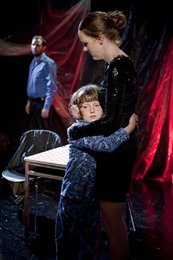Orphans tells the tale of Helen and Danny, a young couple trying to make their life and marriage work in spite of the fact that they live in a tough, working class area, adjacent to an estate that is a no-go area. They both have jobs, have a young son and are expecting another child, though, initially at least, Helen appears to be having second thoughts about their second arrival. She doubts Danny’s commitment, courage and manliness in an environment where being able to stand up for yourself means being prepared to kill.
Another factor which complicates Helen and Danny’s relationship is Helen’s brother, Liam. The opening scene which announces Liam is dramatic. Introduced by the hard urban soundtrack of Massive Attack, Helen and Danny are about to sit down to an evening meal when Liam storms in confused and wearing a white t-shirt covered in blood. Helen’s short black evening skirt and Danny’s casual neatness contrast greatly with Liam’s blood spattered clothes. The couple’s attempts to have an urbane, civilised evening together is thrown into disarray.
 Liam’s story that he found someone badly hurt on the side of the road begins to unravel as he recounts it. Whether he was the perpetrator or not of the violence represented by the blood on his shirt, Danny’s loyalty to Helen and her brother comes into question in that Helen immediately wants him to lie to the police and say that Liam was with them all night. Danny appears to symbolise the last vestiges of a moral code and normal human decency in the midst of a way of life that has become increasingly ruled by the fist, the knife and the gun.
Liam’s story that he found someone badly hurt on the side of the road begins to unravel as he recounts it. Whether he was the perpetrator or not of the violence represented by the blood on his shirt, Danny’s loyalty to Helen and her brother comes into question in that Helen immediately wants him to lie to the police and say that Liam was with them all night. Danny appears to symbolise the last vestiges of a moral code and normal human decency in the midst of a way of life that has become increasingly ruled by the fist, the knife and the gun.
Orphans was originally set in the urban hinterland of Birmingham in the UK. It was a good decision by director Mary Moynihan and the companies involved here to transform the idiom of the action to that of urban, working class Dublin. Although many cities in the UK are nowadays worse than Ireland in terms of gangs and violence, the basic tenets and parameters of Dennis Kelly’s drama are equally true of the tougher parts of our cities. This is not to turn Orphans into a sociological tract because its themes of violence, illness, loyalty, inheritance and love are deeper than that.
Lisa Krugel’s bleak and minimalist set reinforces the sense of despair and hopelessness that pervades Orphans and the environment it ostensibly inhabits. Rags that can represent windows and their curtains or just the walls of the room where the action takes place indicate the struggle and poverty of the milieu Helen, Danny and Liam try to live in. Furthermore, the walls and floors are black. This is a dark place, indeed - a fact emphasised by Conleth White’s lighting which never gets bright enough to suggest there might be some hope here.
Yet all is not hopeless. There remains a glimmer of something else possible through the fact of Helen and Danny’s relationship. At least, this appears to be the case even if events conspire to mitigate against this faint light at the end of the tunnel.
.jpg.aspx%3Fwidth=260&height=171) Much of the tension in Orphans revolves around the character of Liam and his bond with his sister Helen. When we first see Liam we know he has been unhinged by what he has just encountered or done but we’re not sure how deep is his unbalanced state of mind. Bit by bit, though, over the course of what is just one night, it becomes clear that Liam’s split personality embodies both the darkness all around them and that which turns a blind eye to the degradation and dehumanization of a certain tier of society.
Much of the tension in Orphans revolves around the character of Liam and his bond with his sister Helen. When we first see Liam we know he has been unhinged by what he has just encountered or done but we’re not sure how deep is his unbalanced state of mind. Bit by bit, though, over the course of what is just one night, it becomes clear that Liam’s split personality embodies both the darkness all around them and that which turns a blind eye to the degradation and dehumanization of a certain tier of society.
Although we only ever meet this violence as it is retold by Liam, Helen and Danny, we can see its affects through the characters on stage. Adam Traynor excellently carries off the threat and unpredictability of the schizophrenic Liam; Annette Flynn is totally gripping as Helen, a sister torn between sibling loyalty and the chance to escape a lifetime trap as she jumps in and out of gentle solicitude and amoral, emotional ruthlessness; and Colm O’Brien is very convincing as the tricky voice of decency fighting to resist falling into a cycle of violence.
Mary Moynihan’s direction is empathetic yet admirably unsentimental even if, at times, one felt she could have garnered an even rougher and harder edge from the performances. Nevertheless, her understanding of what is at stake propels this production and the actors to such an impressive degree that it makes Orphans essential theatre for our time.
Patrick Brennan was main theatre critic and arts writer with the Irish Examiner from 1994-2004 and is currently writing a book on the theatre of Tom Murphy.